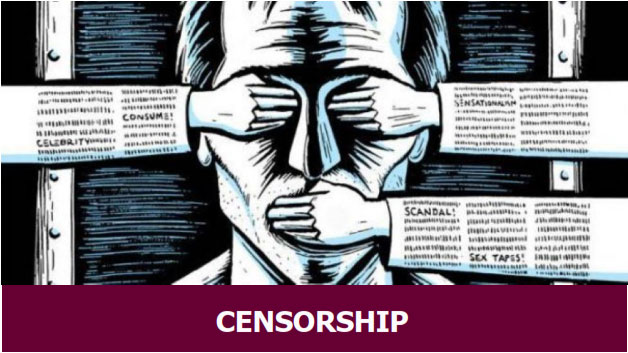
::CENSORSHIP::
History has never seen a better example of role of censorship
and propoganda than the role of Joseph Goebbels. Joseph Goebbels served as
minister of propaganda for the Nazi German government and is generally held
responsible for presenting a favorable image of the Nazi regime to the Germans.
His control of the propaganda machine stretched over all media of the
time-newspapers, radio, films, theater, literature, music and the arts-and he
became a figure to be feared, especially by Jews, who were now in the crosshairs
of the Nazi Party. Propoganda and censorship are two sides of a same coin.
Anyone, who wants to spread his propoganda, needs control over the censorship
instituions. Propoganda and censorship both curb the freedom of expression.
Propoganda curbs freedom of expression indirectly via not letting people get the
correct information, while censorship curbs it directly. A classic example of
censorship in India is the Central Board of Film Certification or Censor Board,
which comes under the purview of Ministry of Information and Broadcasting. The
Board regularly orders, directors to remove anything it deems offensive or
subjects considered to be politically subversive. The Central Board of Film
Certification (often referred to as the Censor Board) is one such institutions
which has censorship authority over films. It has duty of regulating the public
exhibition of films. Films can be publicly exhibited in India only after they
are certified by the Board, including films shown on television. Pahlaj nihlani
is the current director of The Central Board of Film Certification.
The freedom of speech is a fundamental right guaranteed under
the Constitution of India. It has been given the highest level of protection,
this was the level of importance given by the constitution makers to freedom of
expression. However constituion makers believed that absolute freedom of
expression can lead to chaotic and disintegrating conditions in country as
diverse as India. Constitution itself provides the ways through which it can be
curbed. Freddom of expression can be suppressed if it is considered
objectionable, harmful, or necessary to maintain communal harmony.
Censor board has to work with in the limitation mentioned in the
constitution and the cinematography act through which it derives its powers.
However in various past cases The Central Board of Film Certification (or Censor
Board) has gone beyond their scope. At the first place as the Bombay High court
said it is not a board for censoring, it is only a authority for certification
of movies in various categories like U, A, U/A etc. There are various examples
which show that The Central Board of Film Certification is excedding its
authority. Examples like removing the kissing scene from James bond movie or the
recent example of UDTA Punjab where it
came up with 90 odd cuts are clearly restricting the peoples right. These
incidents put doubt over the motive and intentions over the The Central Board of
Film Certification and its director. The Central Board of Film Certification
should not be an instituion to propogate the ideologyof government of the day.
This is a big problem and The Central Board of Film
Certification should understand the mandate given to it. However a far bigger
censorship has been imposed by the people on themselfs or others. There are lot
of cases where ater getting certificate from The Central Board of Film
Certification, films got into trouble. Examples like kissing scene in Dhoom 2
which ended in people burning its movie posters, protest from some portion of
the Muslim Community against Vishwaroopam which forced to delete some important
scenes from the movie before releasing the same. Similarly protest against PK by
Hindu maha sabha and against Da vinci code by some of the Christian community
members is a big jolt to freedom of expression.
The Constitution of India guarantees freedom of speech and
expression with certain restrictions such as that of morality, decency, public
order etc. Further, the Indian Penal Code allows cramping free speech on grounds
of outraging religious feelings, making statements creating or promoting enmity,
hatred or ill-will between classes on grounds of religion, caste, language or
race. The Information Act, 2000 aims to punish people who send offensive
messages online but is often used to target dissident and even posts on social
media.
The Committee chaired by Shri Shyam Benegal submitted major part
of their recommendation to Hon'ble Union Minister of Information & Broadcasting,
Shri Arun Jaitley this evening. Following are the major highlights of the report
-